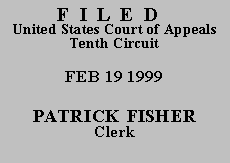

| TERRY WAYNE HENDERSON,
v.
RICK SOARES, Superintendent; THE
ATTORNEY GENERAL OF THE
STATE OF COLORADO, |
|
This appeal is from an order of the district court declining to grant appellant a certificate of probable cause as required by 28 U.S.C. § 2253(c) and further denying leave for appellant to proceed on appeal pursuant to 28 U.S.C. § 1915 and Fed. R. App. P. 24. We agree with the district court that appellant is not entitled to a certificate of appealability and is therefore not entitled to proceed in forma pauperis in this appeal.
Defendant filed this action pursuant to 28 U.S.C. § 2254 on December 9, 1997. His conviction and sentence became final prior to April 24, 1996, the date the one year statute of limitations period contained in 28 U.S.C. § 2244(d) became effective. The district court correctly noted that a prisoner whose conviction and sentence became final on or before April 24, 1996 is barred from seeking relief pursuant to 28 U.S.C. § 2254 unless the prisoner filed his or her application before April 24, 1997. See United States v. Simmonds, 111 F.3d 737, 746 (10th Cir. 1997). Although defendant asserts that the state failed to post 28 U.S.C. § 2244 in an area to which he had regular access or otherwise provide him with notice of its passage, we do not find this allegation presents a colorable claim of unconstitutional state action. He also does not assert a right newly recognized by the Supreme Court or that he has new evidence that the exercise of due diligence would not have discovered.
The defendant argues that the one year limitation period in 28 U.S.C. § 2244(d) should not bar this action because that section is unconstitutional and inapplicable to this habeas corpus application. The district court issued an order to show cause why the one year limitation period should not apply to this action. In response, defendant argued that he only learned of the one year statute of limitations in July of 1997 and that his ignorance of the passage of the Antiterrorism and Effective Death Penalty Act sufficiently establishes cause and prejudice for his procedural default. The district court analyzed thoroughly the issues relating to the application of the one year statute of limitations. We agree with the district court that none of the reasons for equitable tolling are present here and that defendant has failed to show cause why the limitation period should not be applied to this action. We therefore deny the certificate of appealability as untimely and defendant's motion to proceed in forma pauperis on appeal. We dismiss this appeal.
ENTERED FOR THE COURT,
Deanell Reece Tacha
Circuit Judge
*.This order and judgment is not binding precedent, except under the doctrines of law of the case, res judicata, and collateral estoppel. This court generally disfavors the citation of orders and judgments; nevertheless, an order and judgment may be cited under the terms and conditions of 10th Cir. R. 36.3.